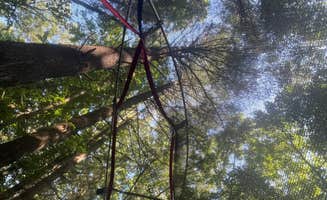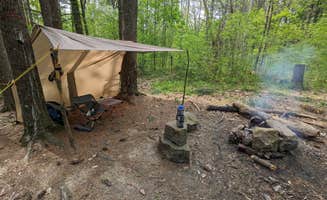Dispersed camping opportunities near Columbus, IN are clustered within Hoosier National Forest approximately 30-45 miles south of the city. Most sites feature elevation changes between 500-800 feet, creating natural drainage during rainfall events. The forest roads accessing these primitive camping areas become challenging when wet, with multiple campers reporting rutted conditions and mud issues during spring and fall seasons.
What to do
Hiking nearby: Peninsula Trail offers multiple hikes ranging from 0.5-7 miles with lake access points. "The Peninsula Trail and Grub Ridge trails both have marked campsites that are very far apart and totally private," notes camper Matt V. at Peninsula Trail.
Wildlife observation: Multiple sites report active wildlife including deer and fox. One camper at Berry Ridge Road - Dispersed Camping shared their experience: "Solo camped here with my dogs... every night at around 5pm I would hear rustling in the leaves, I assumed it was a pack of cayotes and they would leave once I started banging on stuff and primally yelling."
Foraging for firewood: Most sites lack designated firewood supplies but allow fires in established rings. "Plenty of dead wood around to burn," reports Jeremy F., making this area suitable for campers comfortable identifying and gathering appropriate burning materials.
What campers like
Site separation: The distance between camping spots creates unusual privacy for midwest dispersed camping. A visitor to Hickory Ridge Primitive Dispersed Campsites noted: "Very secluded, I got there in a sedan. I pulled in at midnight in a sedan in the winter and i was able to safely find my way."
Night sky visibility: Multiple sites feature minimal light pollution despite proximity to urban areas. "Light pollution is pretty low however, so good stargazing," according to one Peninsula Trail visitor, making these sites suitable for astronomical observation.
Cell service reliability: Unlike many dispersed camping regions, most Hoosier National Forest sites maintain reasonable connectivity. At Horse Camp Rd Dispersed, one camper specifically mentions maintaining adequate signal strength for basic communications.
What you should know
Proper vehicle requirements: While several sites accommodate standard vehicles, road conditions vary dramatically with weather. Amber R. from Sundance Lake Dispersed Camping explains: "I have a promaster conversion and had no trouble making it to this site, however the road was gravel and steep at times."
Total lack of facilities: No sites offer drinking water, waste disposal, or bathroom facilities. "This is pack in pack out, no amenities camping for free," notes one camper, requiring complete self-sufficiency.
Weekend crowds vs. weekday solitude: Traffic patterns follow predictable patterns with significant increases Friday-Sunday. "Just a few sites along the road minimum traffic encountered," reports David S., with most reviewers noting minimal weekday visitors.
Tips for camping with families
Wildlife preparedness: Teaching children proper wildlife response protocols is essential. One camper at Hickory Ridge suggests: "Good spot to get some quality time with the family while being plugged into nature and unplugged from their electronics."
Water access considerations: Lake access points require planning for families. "Long walk to the water so make sure you bring plenty of drinking water. Springs available in the valleys but watch for timber rattlesnakes," advises Elliot F., highlighting the need for sufficient water supplies.
Navigation challenges: Forest roads lack clear signage and cell reception varies. Multiple campers report difficulty finding specific sites after dark, with one noting: "I pulled in at midnight... and was able to safely find my way. Very nice drive during the day, hiking is fantastic!"
Tips from RVers
Length restrictions: Most sites cannot accommodate standard recreational vehicles. A camper specifically advises: "I wouldn't be trying to pull a travel trailer back into here unless it was very small," referring to concrete pads at some locations.
Seasonal access limitations: Mud seasons (March-April, October-November) create significant challenges. "Not very big, I would not bring a Rv here especially after rain," advises one Berry Ridge visitor, suggesting summer and early fall offer best conditions.
Limited turnaround space: Most forest roads lack sufficient width for larger vehicles to maneuver. "Some sites, at least one, could fit a pretty good sized camper," notes Jeremy F., but these appear to be exceptions rather than standard accommodations.



